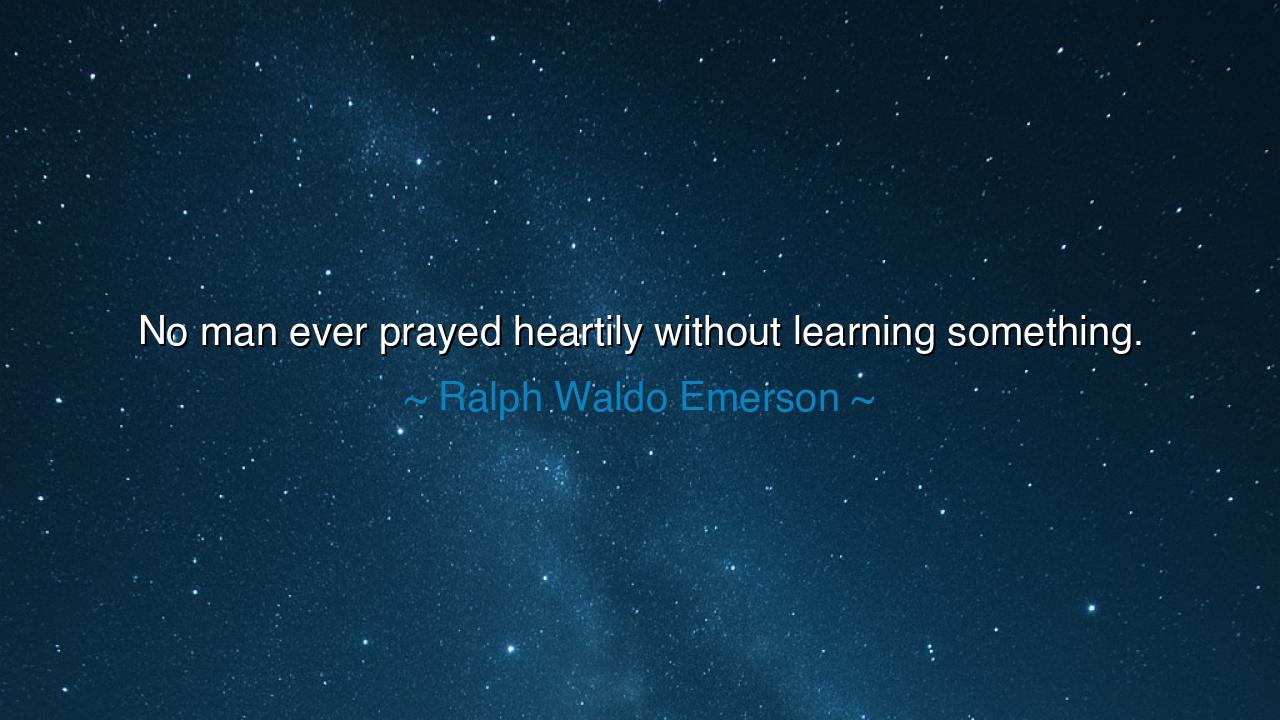
No man ever prayed heartily without learning something.






“No man ever prayed heartily without learning something.” Thus spoke Ralph Waldo Emerson, the sage of Concord, whose pen transformed simple truths into timeless wisdom. In this brief utterance, he reveals the sacred bond between prayer and understanding—that when a man prays not with lips alone but with the full fire of his heart, he is drawn closer to truth. Such prayer is not the recitation of words, but the meeting of the soul with the Infinite. It is in that meeting, that trembling silence between the mortal and the divine, where learning takes place.
Emerson, a philosopher of the spirit and of nature, lived in a time when faith was shifting—from the rigid walls of dogma to the open sky of personal revelation. He saw that true prayer was not confined to temples or altars, but lived in the honest cry of the heart. To pray heartily was, for him, to confront oneself before the vastness of existence—to confess ignorance, to surrender pride, and to listen deeply. And in that surrender, the soul learns—about humility, about longing, about the unity of all things. It is not the world that teaches in such moments, but the whisper of the divine within the human spirit.
To understand the depth of his words, think of Socrates, the ancient philosopher who claimed to know nothing yet spent his life in pursuit of truth. Though he spoke not of prayer as the devout might, his ceaseless questioning was itself a kind of prayer—a reaching out from man to the mystery of wisdom. Every question he asked was a form of reverence; every answer, a revelation. Like Emerson’s ideal of the earnest prayer, Socrates’ dialogue with truth was not a demand for power, but a search for light. Thus, to pray heartily is to ask—not for possession, but for perception.
Consider also the story of Abraham Lincoln, who, in the darkest hours of the American Civil War, would retreat alone into silence. Those who knew him said he was not a man of many public devotions, yet he confessed that he often fell to his knees because he had nowhere else to go. In that act of surrender, he did not seek victory for himself, but wisdom for his nation. And it came to him—not as thunder, but as understanding. When a man prays with his whole being, he learns not what he expects, but what he most needs.
Emerson’s insight pierces deeper still. For prayer is not only communion with God—it is reflection with oneself. The one who prays sincerely must lay bare his desires, his fears, and his doubts. In doing so, he discovers his true motives, his hidden strengths, and his forgotten hopes. He learns humility when his plea goes unanswered, and gratitude when it is fulfilled. He learns that faith is not certainty, but trust. Thus, every heartfelt prayer is a lesson in self-knowledge, whether or not Heaven seems to reply.
And yet, Emerson warns silently against hollow ritual—the empty murmuring of words that reach no higher than the tongue. Such prayers teach nothing, for they are not born of the soul. Only when prayer becomes alive, when it trembles with sincerity and burns with yearning, does it become a path of learning. For the divine does not answer through sound, but through transformation. The man who prays earnestly may rise from his knees with the same life around him, yet he himself will not be the same.
So, O seeker of wisdom, take this lesson to heart: pray not to be heard, but to hear. Pray not for favor, but for understanding. Let your prayers be honest, even if they are filled with doubt, for even doubt, when offered with sincerity, is a form of faith. When your heart speaks truly—to God, to the universe, or to your own conscience—you will always come away with knowledge, for the act of turning inward and upward is itself a revelation.
In the end, Emerson’s truth is simple yet eternal: every sincere act of communion—whether in words, silence, or service—opens the eyes of the spirit. No man ever prayed heartily without learning something, because to pray with the heart is to awaken the soul. And the awakened soul learns not from books nor from men, but from the whisper of eternity that speaks in stillness, saying: “Be still, and know.”






AAdministratorAdministrator
Welcome, honored guests. Please leave a comment, we will respond soon